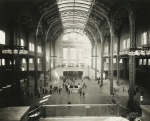Difference between revisions of "Chapter 16"
(→Page 121) |
|||
| Line 55: | Line 55: | ||
Chicago taxi wars of the 1930s were a violent chapter of urban and underworld history, when cab companies, gangsters, and corrupt officials fought for control of the city’s lucrative taxi market. In the late 1920s and early 1930s, taxi service in Chicago was chaotic and unregulated. | Chicago taxi wars of the 1930s were a violent chapter of urban and underworld history, when cab companies, gangsters, and corrupt officials fought for control of the city’s lucrative taxi market. In the late 1920s and early 1930s, taxi service in Chicago was chaotic and unregulated. | ||
Multiple companies competed, notably the Yellow Cab Company, founded by John D. Hertz (later the car-rental magnate), Checker Taxi Company, controlled by Morris Markin, and smaller independents - like [https://en.wikipedia.org/wiki/Parmelee_System Parmelee] - many tied to criminal syndicates after Prohibition. The Great Depression intensified competition. When fares and profits dropped, rival cab companies began sabotaging, bombing, and shooting each other’s drivers to gain control of territory. | Multiple companies competed, notably the Yellow Cab Company, founded by John D. Hertz (later the car-rental magnate), Checker Taxi Company, controlled by Morris Markin, and smaller independents - like [https://en.wikipedia.org/wiki/Parmelee_System Parmelee] - many tied to criminal syndicates after Prohibition. The Great Depression intensified competition. When fares and profits dropped, rival cab companies began sabotaging, bombing, and shooting each other’s drivers to gain control of territory. | ||
| + | |||
| + | ==Page 122== | ||
| + | '''Broadway Limited cranked up to go'''<br /> | ||
| + | The Broadway Limited was the Pennsylvania Railroad’s most famous passenger train, connecting New York and Chicago — the pride of American rail travel for decades. | ||
Revision as of 16:33, 3 November 2025
Page 115
Little Cosenza
a locale, possibly a Pynchon invention, Calabrian-flavored micro-enclave name riffing on real Chicago neighborhoods.
Page 116
"Liberty, out for a stroll [...] around dawn"
Page 117
"Packard Custom Eight limousine [...] no chrome, no wax job, no shine, flat black all over"
"I call it spinach"
1930s slang meaning a sarcastic dismissal, i.e., "I call it nonsense," "I don’t buy it";
Page 118
omertà
Italian: a code of silence and loyalty, especially associated with the Mafia and other criminal organizations in southern Italy and their offshoots in America.
a roscoe he may not be carrying
"roscoe" is American gangster/slang for a gun, most often a handgun (a revolver)
che figata
An informal Italian exclamation meaning roughly "How cool!", "That’s awesome!", or "What a great thing!"
Chazzy's umbatz
In vaudeville, burlesque, and comic radio talk, umbatz was a sound word that turned into an adjective, describing someone wild, excitable, or mentally offbeat — the kind of character who’d make noisy gestures, talk fast, or act manic, like a musical oom-pah caricature come to life.
"miles o' smiles, as it sez in the ads"
"Miles o’ Smiles" was a popular advertising and publicity slogan in the early 1930s — especially tied to the 1933–1934 Chicago World’s Fair, officially known as "A Century of Progress," capturing the cheerful, modern, and escapist tone the fair tried to project during the Great Depression: optimism through technology, entertainment, and American ingenuity.
Page 119
D and D
That'd be Deaf and Dumb
booby-hatch leave
This old phrase means someone is temporarily out of an asylum, either on furlough, escaped, or jokingly described as such. In 1930s slang, it could be used literally (for a patient released for a short time) or sarcastically, to imply someone crazy is on the loose.
dance like those Castles do
The Castles dancers refers to the legendary husband-and-wife dance team Vernon and Irene Castle, who were among the most influential figures in American popular dance in the 1910s.
Page 120
gabadost
A sort of mock-Italian slang meaning “a fancy guy,” “a hotshot,” or “somebody full of himself.”
nun sò che
The Italian phrase meaning "I don’t know what," but it’s used idiomatically to express a vague, indefinable quality, like saying in English, "a certain something" or, in this context, "vibe."
Page 121
The main concourse at Union Station
"Taxi-war veterans"
Chicago taxi wars of the 1930s were a violent chapter of urban and underworld history, when cab companies, gangsters, and corrupt officials fought for control of the city’s lucrative taxi market. In the late 1920s and early 1930s, taxi service in Chicago was chaotic and unregulated.
Multiple companies competed, notably the Yellow Cab Company, founded by John D. Hertz (later the car-rental magnate), Checker Taxi Company, controlled by Morris Markin, and smaller independents - like Parmelee - many tied to criminal syndicates after Prohibition. The Great Depression intensified competition. When fares and profits dropped, rival cab companies began sabotaging, bombing, and shooting each other’s drivers to gain control of territory.
Page 122
Broadway Limited cranked up to go
The Broadway Limited was the Pennsylvania Railroad’s most famous passenger train, connecting New York and Chicago — the pride of American rail travel for decades.


